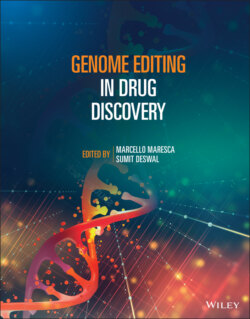Читать книгу Genome Editing in Drug Discovery - Группа авторов - Страница 55
4.2 CRISPR Resources and Reagents for Bespoke Editing and Genetic Screening 4.2.1 Publicly Available Resources
ОглавлениеCRISPR technologies have been quoted as being the “Swiss army knife” equivalent for the science world, due to the ease of their design and generation – as compared with zinc‐finger nucleases (ZFNs) and transcription activator‐like effector nucleases (TALENS) – and the diversity of their applications (Doench 2018; Mans et al. 2015). Furthermore, the “open‐source” culture of the CRISPR field has helped accelerate its continued innovation (Zhang 2019). This has been facilitated by numerous resources like web‐based tutorials, publicly available webinars, databases for data deposition, and annual CRISPR meetings. For example, a freely available resource called the Open Repository for CRISPR Screens (ORCS) (https://orcs.thebiogrid.org) was developed by the Biological General Repository for Interaction Datasets (BioGRID) (Oughtred et al. 2019), which enables researchers to search, filter, and download CRISPR screen datasets. Version 1.0.3 of the ORCS contains 895 CRISPR screens from 3 major model organism species and 629 cell lines. In addition, when novel methodologies are published, the associated constructs often become available through repositories like Addgene, an international nonprofit repository (Kamens 2015), to which over 350 labs have contributed. Reagent sharing has the advantage that it enables vigorous testing of the new technology and encourages rapid further improvements. However, Addgene is not accessible to for‐profit organizations; thus, for industry/biotech institutions, the only access to reagents is via commercial providers.
There are many commercial providers of CRISPR reagents and major suppliers will be discussed further below. However, it is important to highlight that for pharma and biotech companies, before any work can begin and reagents purchased, it is important to ensure that there is appropriate product use license agreement to allow freedom to operate. In the case of CRISPR, this poses challenges as the foundational CRISPR patents are still under dispute for the United States and Europe with Jennifer Doudna of the University of California, Berkeley, and Emmanuelle Charpentier (formerly of the University of Vienna) competing for patent rights against Feng Zhang of the Broad Institute of MIT and Harvard University (Cohen 2019). Moreover, according to a recent patent review, beyond the foundational patents, 2072 additional patent families associated with CRISPR were filed up to a 31 December 2017 priority date (Martin‐Laffon et al. 2019).
